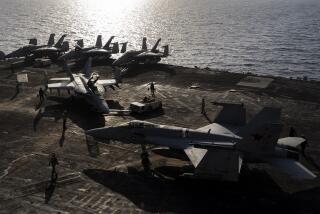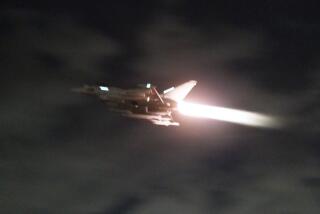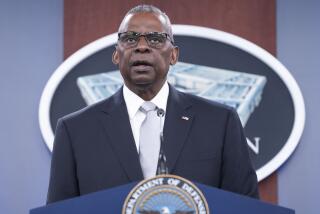Navy Can Keep Gulf Open but May Pay a Price: Crowe : Admiral Warns U.S. Could Face ‘Difficult Choices’
- Share via
WASHINGTON — The Navy can back up President Reagan’s promise to keep Persian Gulf oil lanes open, but the price could be more American military casualties, the chairman of the Joint Chiefs of Staff said today.
Adm. William J. Crowe Jr. also told the Senate Armed Services Committee that the Pentagon would be faced with “difficult choices” if Iran decides to strike American ships or Kuwaiti tankers flying American flags.
Crowe, the nation’s top uniformed officer, declined to say publicly what those choices might be but promised to talk about them in a closed-door meeting of the panel.
At the Pentagon, meantime, officials said one of many “contingency options” being studied is a preemptive strike against Silkworm anti-ship missiles purchased by Iran from China.
Strike Not Supported
But the officials, speaking on condition of anonymity, said officials “don’t support it (a preemptive strike) and don’t think its viable.”
In public, Crowe did not mention the Silkworm missiles, which could threaten ships moving through the Strait of Hormuz at the mouth of the gulf. The missiles have a range of about 50 miles, which is wider than the strait, and U.S. military officials have worried that the weapons could be used against Navy ships or reflagged Kuwaiti tankers passing by.
One official at the Pentagon said a preemptive strike against the missiles might involve a major attack on Iran.
“These missiles are mobile,” said the source. “They don’t need fixed batteries. They can be set up relatively rapidly. What are you going to strike, the entire military base where they might be stored?”
Reagan Pledged Supply
Crowe’s comments in the open committee were his first public statements to Congress since Reagan pledged last month to use U.S. military force to keep open the gulf, through which passes much of the oil used by the Western world, although only 7% of that used by the United States.
Reagan promised to put U.S. flags and captains aboard Kuwaiti tankers. Crowe, noting that Kuwait is an ally of Iraq in the 6 1/2-year-old Iran-Iraq war, said the U.S. move will certainly raise the stakes.
Congressional fears have been heightened in the wake of the Iraqi missile attack on the U.S. frigate Stark, which killed 37 sailors. Iraq said the strike was a mistake, and Crowe said today he agrees.
Crowe noted Reagan’s promise to protect the Kuwaiti tankers and said the Joint Chiefs “believe that we can carry out this mission.”
“Of course,” he added, “there are no absolute guarantees that such an operation will be casualty-free, or that Iran will not escalate the sea war, which will present us with further difficult choices.
More to Read
Sign up for Essential California
The most important California stories and recommendations in your inbox every morning.
You may occasionally receive promotional content from the Los Angeles Times.












